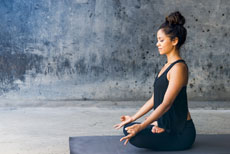
Discover the difference between these two terms linked to holistic wellbeing
Do you feel constantly bombarded by demands on your attention and energy? Are you a master multi-tasker? Are you feeling stressed, overwhelmed or anxious? Would you like to have more joy in your life?
If you answered yes to any of these questions, meditation and mindfulness could be the answer. So, what’s the difference?
Mindfulness is a certain way of paying attention, and bringing awareness to whatever is happening in the moment. The second part of this statement is important—mindfulness is different than paying attention in class or a meeting.
There are three key characteristics of mindfulness that set it apart from generally paying attention. Mindfulness means:
- Having intention to be attentive
- Being open to the idea of being present and honest with yourself
- Observing what’s happening, rather than trying to control what’s happening
Meditation is one of the ways you can train yourself to work toward mindfulness. As a comparison, if you have a goal of achieving better physical fitness, you might engage in regular exercise. To achieve physical fitness, you need to put in the work of moving your body. Similarly, to work toward mindfulness, you need to develop methods to support that goal.
There is a common misconception that meditation is about “not thinking.” And that’s just not possible! Rather, meditation asks us to allow thoughts and emotions to come, recognize each, and then let them go.
There are many styles of meditation that can include moving or sitting still. Sometimes there is an assigned task (sometimes called an “anchor point”) for the brain to focus on—breathing, moving, listening to sounds, identifying feelings, etc.—rather than obsessing over the racing thoughts that can be present while you go about your day.
Meditation isn’t just for advanced practitioners or spiritual gurus. Rather, meditation is something that everyone can do.
My schedule is already packed, how can I make time for one more thing?
Meditating for just a few minutes can be beneficial, especially if you practice on a daily basis. The consistency of doing just a few minutes a day is more valuable than saving up to do 30 minutes on one day of the week. We suggest that if you can’t find time throughout the day to use time you already have—for example, during the commute to/from work.
What to expect from a regular practice
At its most basic, meditation is a pause we create in the activity of the external world. Our bodies and our minds respond to this pause by becoming more calm and relaxed. When we are relaxed, our bodies have a chance to heal and repair. Our minds have a chance to recharge.
Meditation is an important form of self-care that shows yourself—and those around you—that you are a priority.
Give it a try
Book a One-on-one guided meditation session at the George Wellbeing Center.